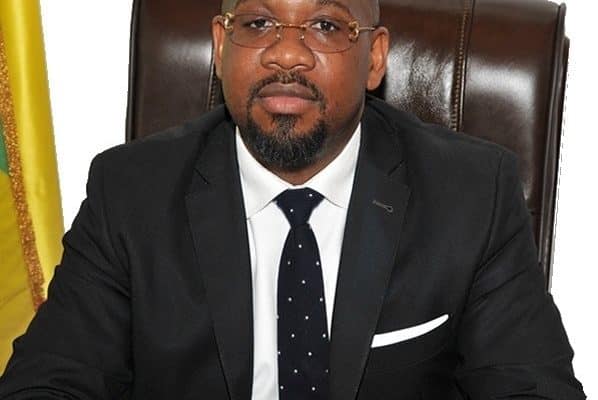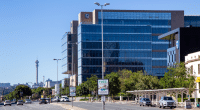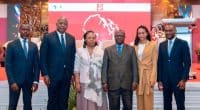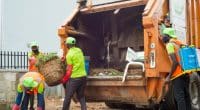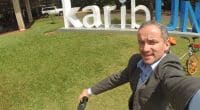While African governments are responding to the threat of climate change, the Republic of Congo is doing the same, although it is less affected than some countries on the continent. In this interview, Juste Désiré Mondele, Congo's Minister Delegate for Decentralisation and Local Development, presents the climate change adaptation policy implemented in this Central African country, while expressing reservations about global objectives that are often ill-suited to the realities of the continent.
Delphine Chêne: Climate change is now a global problem that impacts various activities such as agriculture, livestock farming, water, energy (…). Is the phenomenon being taken seriously in the Republic of Congo today?
Désiré Mondele (DM): Climate change is not sparing the Republic of Congo and is taken very seriously because, for example, we are seeing changes in the seasonal cycle and we can see that this situation is having a negative impact on agro-pastoral activities. The Head of State of the Congo, Denis Sassou-Nguesso, has made this his priority, not only at the level of the Congo, but at the level of the Congo Basin, since he has created the Blue Fund for the Congo Basin. This is a fund that is intended to help not only those who are victims of the effects of climate change, but also to enable a mechanism to protect the environment.
And you are doing this in different sectors of activity impacted by climate change. Although this issue has not yet arisen in the water sector in the Congo, given the abundance of this resource, it could very quickly arise and in this case flirt with the problems of obsolete facilities and insufficient funding. So your approach is based on PPPs? Why do you think so?
DM: The implementation of the National Development Programme (NDP) 2022-2026, which aims to improve the quality of life of the population, logically requires financial means. And today, the Congolese state, which is in partnership with the International Monetary Fund (IMF), cannot on its own guarantee the financing of the projects to be carried out. Hence the innovative financing mechanisms such as public-private partnerships (PPPs). These are concessions. So a private operator can finance a project and benefit from a concession agreement over a period of time through fees or user fees for these works to amortise its financing.
In February 2023, the Swiss company 3 P Renewables Switzerland (3PRS) was awarded the concession contract for the production of drinking water in Pointe-Noire as part of a BOOT (build, own, operate and transfer), a form of PPP.
DM: The PPP has also worked very well in the past for the autonomous port of Pointe-Noire. The modernisation of the port yesterday with the Bolloré Group was carried out through this partnership mechanism between the State and the private sector.
What about electricity ?
DM: The government recently laid the foundation stone for the plant that will transform gas into liquefied gas for use as energy in Point-Nord. So today, we are in oil, but we are also moving towards the use of gas because there is a gas power plant in Pointe-Noire. And next to this gas plant, there is a supplement (the whole gas liquefaction formula). Instead of flaring oil wells, this gas will be transformed into electricity to supply households and industries in the Republic of Congo.
There is also the problem of mobilising the resource within the framework of PPPs, because there is the production of energy, but also the transfer of this resource. So the mechanism is being put in place so that a broad coverage of electricity in the country is achieved.
The former Congolese Prime Minister said: “It is ultimately complicated in Africa to reconcile economic development with the requirements of sustainable development”. Do you share this view?
DM: He is not totally wrong because today: what is going on? Let’s take fossil fuels for example. It is said that we should get out of oil and move towards so-called clean energies. Except that Europe has had time to industrialise and we still see those who were talking about closing coal-fired power stations reopening them today. This is changing fundamentally because, with the crisis in Ukraine, there is an economic reality with a scarcity and high cost of hydrocarbon and other resources. And this is the challenge.
Today, the African genius would like us to manage to reconcile development and sustainable development.
In other words, we have to reconcile environmental protection with industrial development because we have to industrialise. We have to manage to transform our own resources locally, even if it means exporting them as finished products in order to have added value, rather than doing the opposite. Because if we say to leave fossil fuels and use only renewable energies, the energy transition has a cost that we have to pay and until now we haven’t received much in terms of the carbon fund and everything else. So we have to be pragmatic and realistic. We are talking about human lives. We are talking about a continent with a demography that is clearly changing. We think that Africa is the continent that is going to evolve very quickly in terms of demography, with the challenge of population that is present and all the challenges of health care, drinking water supply, etc. I think governments have the capacity to reconcile environmental protection with industrial development. It is even a matter of people’s lives to protect the environment.
Can decentralisation accelerate sustainable development in the Republic of Congo, given that the challenge today is also to reconcile decentralisation, governance and territorial development by making the local level “the basic brick” ?
DM: “The basic brick” today is indeed to make the populations themselves take charge of the management of local areas, the management of services. And this is done through elected councils, and therefore through decentralisation. Decentralisation is simply the transfer, through the principle of subsidiarity, of certain competences from the state to local authorities.
In the Republic of Congo, decentralisation is not a political choice, it is a constitutional requirement. And so decentralisation is the tool through which there are several transfers of matters. This has already been done with health and education, but there are several other matters that must follow. And I like the expression “basic brick” all the more, and it is this brick that should be the epicentre of the harmonious development of the territories through State financing mechanisms, but also through equalisation mechanisms to allow the communities to develop harmoniously according to their geographical situation, their natural resources, etc.
Interview by Delphine Chêne

